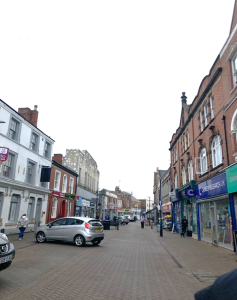
This snapshot is taken in Long Eaton, near the school I go to. This area is traditionally the heart and soul of Long Eaton’s market.
On Saturday, this marketplace should typically be bustling, but this is clearly not the case. This may be due to the cost-of-living crisis which is ongoing throughout the UK.
The current rate of inflation, measured by CPI, has increased to 8.7%, this has significantly increased the average price of the basket of goods. As a result, consumers are staying at home and avoiding going into their local towns and are not spending to boost their local economy. Consumers would like to spend post-Covid, however they are unable to as the cost of necessities, such as electricity and gas has risen and 56% of adults are using less fuel due to this increase in price. This means that people have less disposable income, so consumption of non-necessities has fallen.
Local businesses may have to shut down or decrease their labour force, reducing fixed costs, so that average cost can fall to help keep the firm in the market. As consumers have cut their spending on goods and services, firms’ revenues have fallen, at the same time as costs are rising. Firms have been hit by inflation too and have a choice to increase prices, reduce costs or accept lower profits.






